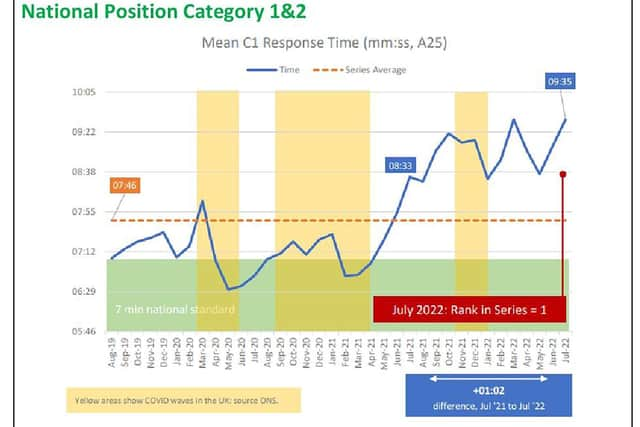Lincolnshire councillors raising alarm bells over ambulance delays


The County Council’s Health Scrutiny Committee on Wednesday was told that since coming out of the second phase of COVID there had been an “almost exponential rise” in category one calls nationally, also reflected in Lincolnshire.
Neil Scott, East Midlands Ambulance Service head of operations for mid-Lincolnshire, presented data showing response times have risen by nine minutes for the worst incidents since May 2021 and by nearly an hour for category two incidents.
Advertisement
Advertisement
In Lincolnshire, between January and August 2022, calls to the service have risen by 7.9 per cent, with category one calls rising by 29.67 per cent.


However, attempts to send patients through alternative pathways have also increased by just over half.
Mr Scott, however, told councillors: “The issue of slow ambulance response times and ambulance delays is not an ambulance problem… It’s a system wide problem involving acute hospital colleagues, social care and discharge.
“It’s a multifaceted issue that needs to be owned by all those different partners to reach a solution.”
Advertisement
Advertisement
The issues were also exacerbated by staff sickness which had hit a peak of nearly 10 per cent in August, and difficulties in recruitment and retention.
In some instances services were losing more than 72 hours to pre-handover delays in Lincolnshire.
Sue Cousland, divisional director for Lincolnshire Division of EMAS, said efforts were being made to improve the situation including a new tactical command structure, new station managers and clinical care teams.
However, Coun Mark Allan, from Sleaford, said the information “provides some degree of concern… particularly in the category one and category two responses”.
Advertisement
Advertisement
“Nobody seems to be getting to grips with the problem as a whole and say we must do this, this this this this to see things through to an improved situation,” he said.
Ms Cousland told councillors there were meaningful conversations from all partners and denied organisations were working in silo.
“We’re working collectively across the system and I hope that goes some way towards giving a degree of assurance that the system works together and not in isolation.”
However, she did not reassure Coun Allan who said: “When the figures start changing significantly, rather than beyond a rising, rising worsening situation – perhaps I will.”
Advertisement
Advertisement
Coun Tom Smith agreed that problems went back to before the NHS split into more parts.
“I don’t doubt how hard you’re working, but the fact that you’re giving those wait times to me is deeply alarming, because what you’re saying is, we haven’t got the resource, you’re going to be waiting for six hours or three hours.
“I’ve got serious alarm bells ringing in my head that we are going to see people either have worse clinical outcomes, or people may lose their lives,” he later added.
Councillors, however, were keen to say that criticism was not of the staff themselves, but of the system as a whole.
Members voted in favour of “strongly encouraging” further work with acute hosptials to improve timely handover of patients.